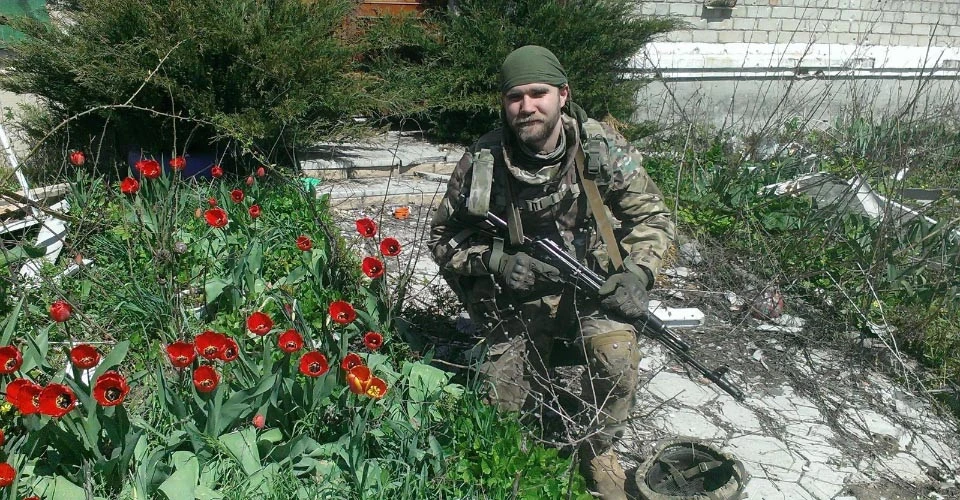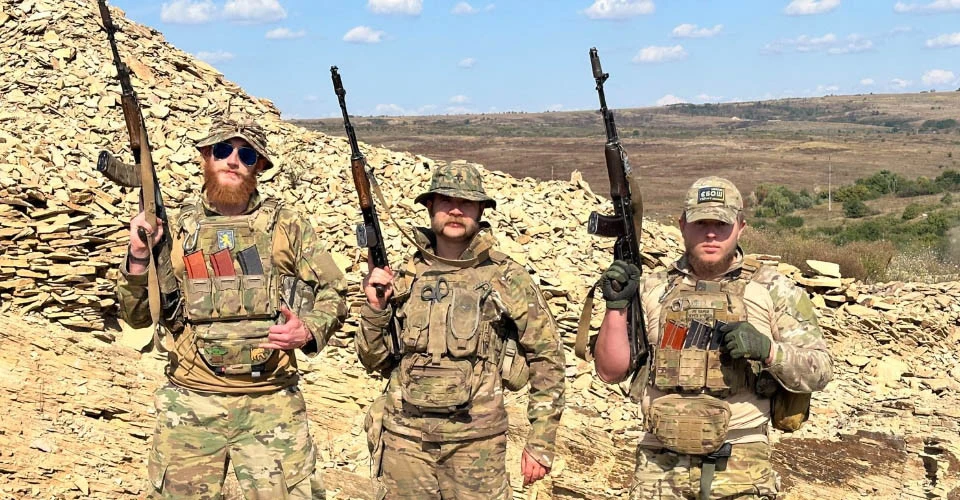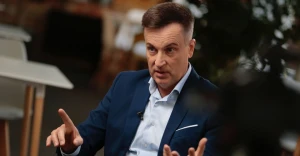
Ukraine’s army will break through front again and move on, now is critical point – soldier
The man has been fighting since 2014. During Russia's full-scale invasion of Ukraine, he fought in the south, in the Donetsk region, took part in the counteroffensive in the Kharkiv region and recently in the liberation of Klishchiivka
The story of Sviatoslav is told by Espreso.
Sviatoslav is a platoon sergeant in an anti-tank guided missile company in one of the brigades of the Ukrainian Armed Forces. He began fighting the occupying Russian forces after the Revolution of Dignity. He joined the army as a volunteer.
This decision was preceded by the Revolution of Dignity. The man was a student at the time. He was studying at the Ivan Franko National University of Lviv at the Faculty of History. At the time, he believed that students should not stay away from the events taking place in the country. Moreover, he was a historian and wanted not only to study history but also to create it.
"I had the opportunity to protest. The ideas that were pulling Ukraine away from Russia and toward the freedom-loving West were very close to me," says Sviatoslav. "That's why I participated in the Revolution of Dignity and then volunteered for the war. Back then, everything was just beginning and we thought it would end quickly. I believed that if everyone took up arms, if we united as a society, we would win quickly. For me, the conflict in the east was a continuation of the Maidan. Our eternal enemy had to be repelled. We had to push this Asian Russia as far away as possible."
If not for the war, Sviatoslav would have stayed at the university. He planned to enter graduate school and teach history. But life turned out differently and the man went to the east with arms in hand. At first, he joined the second operational battalion of the Ukrainian National Guard. According to Sviatoslav, they recruited volunteers from the Maidan. Shortly before that, he went on his first combat tour. He got to Slovyansk.
"At that time, the city was still occupied," the soldier recalls. "We occupied checkpoints around it. Then we managed to liberate the city. Although it was unexpected. I woke up in the morning, had to go to the checkpoint, and they told me: Slovyansk is already free. We started to enter, to do minimal clearing. That is, we were already entering an empty city."
After Slovyansk, Sviatoslav went to Debaltseve with the Serhiy Kulchytsky Operational Battalion. He stayed there until October 2015 and decided to return to civilian life to complete his studies. And then he was always at war. In 2015, he joined the volunteer Ukrainian corps Right Sector, and in 2017 he signed a contract with the Armed Forces of Ukraine.
"This conflict is generally very interesting from a historical point of view," says Sviatoslav. "I would distinguish several stages. Before Ilovaisk, the Russians used the tactics of small-scale warfare, which the Chechens waged against them. That is, they attacked checkpoints and positions in small groups. That is, it was not a regular war. And when Ilovaysk happened, they invaded with their troops. It was already a limited large-scale war, with tanks and armored personnel carriers on both sides. In Debaltseve, the airport, the Shyrokyne operation, it was already a standard war.
Later, in the spring of 2015, everything turned into a positional war. Fighting for the neutral ground. Sabotage and reconnaissance groups went through the neutral zone, looking for weaknesses, destroying individual platoon strongholds and then occupying them. In 2019, the situation began to stabilize, as shooting was banned on most of the frontline. It has already turned into a healthy border. Of course, there were hotspots, like Avdiivka and Shyrokyne, where there were battles. But it was mostly quiet. And now it's a full-scale war using all weapons. Even biological weapons. We have had cases of poisoning."
Sviatoslav knew that there would be a full-scale war between Russia and Ukraine. But he foresaw it a little later. So in 2022, he resigned from the army and wanted to live a civilian life. But three months later, the Russian Federation started a major war. So the man returned.
"I was amazed that they decided to attack," says Sviatoslav. "The Russians were doomed from the beginning. You know, they say that a battle is won before it is started. And they had a losing option from the start. I was also struck by their cruelty. They are Asians. There are people there who believe in shamans and spirits. And their attitude to human life is that they do not value their own. I was very impressed by the way of life. They always smell bad. We took prisoners of war, so we know. They wash much less often because they are forbidden to have contact with civilians. They are thrown into the landing, they say: you live here, you cannot go anywhere. They send people in packs to attack, shoot their own people or throw them into pits and torture them for not wanting to attack."
During the full-scale war, Sviatoslav fought in the south, the Donetsk region, and in the counteroffensive in the Kharkiv region. He emphasizes that he has never encountered such difficult conditions during his time at the front.

Photo: Sviatoslav's photo archive
"It used to be easier because UAVs were not used so often. We can't even move at night, because they raise drones with thermal imaging and shoot at us," emphasizes Sviatoslav. "It's very difficult to operate in such conditions. Plus, the enemies do not spare shells. Sometimes we are driving on the road, and shells fall, and you think: ah, they fell, so we have a few minutes to drive before they start shooting again. The situation is complicated. They are shelling the supply and approach routes, using night drones. We are under surveillance around the clock. FPV drones are attacking our equipment, helicopters are being raised, which are also attacking us at a distance where it is difficult to hit their MANPADS. So even moving to the position is difficult."
The Russian forces managed to build a defensive line and fortify it
He explained why the counteroffensive is now more difficult and slower than it was last year. According to him, the enemy's flank was not covered in the Kharkiv region. Everyone was talking about Kherson, and the Russians moved their forces there. They also did not have the strength to advance further in Kherson, and it was not advisable to hold the city. But during this time, they managed to build a new defense line and fortify it.
"They pulled up reserves to hold the entire line. In addition, during this time, they have been mining," notes Sviatoslav. "They are also learning. The Russian army of last year and now are not comparable. Although, they have many gaps that we have already closed. It may be that we will break through the front again and go further, but now is a very critical point. They are plugging all their gaps with "live meat," and when they run out of it, the front may collapse at any moment. But we need to work on this. They have managed to build and organize a defense line."

Photo: Sviatoslav's photo archive
Why the liberation of Klishchiivka and Andriivka is important
Recently, Sviatoslav participated in the liberation of Klishchiivka in the Donetsk region.
"In Klishchiivka itself, it was difficult to move around because everything was shot up," says Sviatoslav. "We inflicted more damage on them, because we have the latest weapons, more precisely. But they also created a lot of inconvenience. Now they are gathering reserves, trying to recapture the liberated territories, and counterattacking very hard. They are not sparing people, taking them from other areas, forming assault groups. But these groups do not live very long. There is nothing and no one in Klishchiivka itself, just a pile of bricks. Not a single surviving house, a war for basements. Everything is destroyed. Andriivka is the same way. They fought for those villages and did not want to give them up. They imagined that it was their Stalingrad."
However, Sviatoslav emphasizes that the liberation of Klishchiivka and Andriivka is strategically important. Because the Russian forces are moving people here from other areas, thus weakening them. In addition, they manage to destroy their manpower and disable combat-ready units. And most importantly, it is a foothold to move on.
The Defense Forces have completely liberated Klishchiivka, but the Russian troops are trying their best to retake the village.
Major Rodion Kudriashov, deputy commander of the 3rd Detached Assault Brigade of the Ukrainian Armed Forces, explained on Espreso how events will unfold after the liberation of Klishchiivka. In particular, he noted that there is an opportunity to liberate Bakhmut from the occupying Russian forces.
- News













































